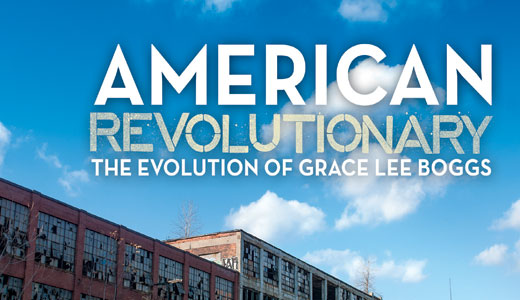
LOS ANGELES – Cinema without hard-hitting politics is like pancakes without syrup. Although they may not be the majority of movies being screened at showcases, many festivals feature films of compassion, controversy, consciousness, and conscience, including one of the nation’s top filmfests, the Los Angeles Film Festival, held here June 13-23. LAFF’s roster of 200 films features 25 or so decidedly left-leaning entries listed in the program guide as “Social Awareness” productions.
American Revolutionary: The Evolution of Grace Lee Boggs is not only listed under that heading but is also one of a similar number of nonfiction works categorized as “Documentary.” This progressive picture is about the Chinese-American woman whom Angela Davis declares onscreen to have “made more of a contribution to black people than most blacks.” The former Weatherman Bill Ayers also lauds the longtime Detroit-based activist, who is identified in the doc as “a Marxist theoretician” and “black power” advocate.
“Revolutionary” is engagingly, wittily directed by Grace Lee. No relation to her doc’s subject, Lee first stumbled upon Boggs a decade ago while making another nonfiction film, 2005’s The Grace Lee Project, about various women named Grace Lee, in order to debunk stereotypes of Asian females. The UCLA Film School grad had no idea what she was getting into 10 years ago. Revolutionary is a solo look at what I’d imagine is the most singular of her previous doc’s various subjects, the dogged if not dogmatic, indefatigable Boggs. Lee appears onscreen in Revolutionary, but the focus remains fixed on Boggs. Lee has a good film sense and her techniques run the gamut, from naturalistic talking heads footage (including of Bill Moyers, Ruby Dee, Ossie Davis, and Danny Glover) to the imaginatively cinematic. For example, in sharp contrast to most longwinded left-wing intellectuals, Lee humorously sums up Hegel and Marx in 30-second montages, and creatively uses reverse motion historical news clips to represent going back in time for this biopic about Boggs.
As Boggs’ life has spanned almost a century, plenty of American history is chronicled in this Detroit-centered doc. During the 1940s Boggs wed African American radical James Boggs and they set up shop, so to speak, in that hub of the industrial proletariat, “Motor Town.” The Boggses were champions of the rabblerousing Malcolm X, and when the rabble roused – the 1967 Detroit riot, or “uprising” – it’s covered at length in this film.
The effervescent 97-year-old Boggs has evolved in her thinking and may have renounced violence as a means of attaining revolutionary ends. Grace Lee Boggs attended the festival screenings in her wheelchair, took part in Q&As with Lee, and appeared on Tavis Smiley’s PBS talk show on June 21. An inspiration on- and off-screen, this radical icon remains full of grace: Bogged down she’s not, as she remains ready for the revolution, whatever form it may take. Watch for local release.
“American Revolutionary: The Evolution of Grace Lee Boggs“
Directed, written by Grace Lee
2013, 87 min.












Comments